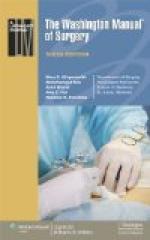DELIRIUM IN SURGICAL PATIENTS
Delirium is a temporary disturbance of mind which occurs in the course of certain diseases, and sometimes after injuries or operations. It may be associated with any of the acute pyogenic infections; with erysipelas, especially when it affects the head or face; or with chronic infective diseases of the urinary organs. In the various forms of meningitis also, and in some cases of injury to the head, it is common; and it is sometimes met with after severe haemorrhage, and in cases of poisoning by such drugs as iodoform, cocain, or alcohol. Delirium may also, of course, be a symptom of insanity.
Often there is merely incoherent muttering regarding past incidents or occupations, or about absent friends; or the condition may assume the form of excitement, of dementia, or of melancholia; and the symptoms are usually worst at night.
#Delirium Tremens# is seen in persons addicted to alcohol, who, as the result of accident or operation, are suddenly compelled to lie in bed. Although oftenest met with in habitual drunkards or chronic tipplers, it is by no means uncommon in moderate drinkers, and has even been seen in children.
Clinical Features.—The delirium, which has been aptly described as being of a “busy” character, usually manifests itself within a few days of the patient being laid up. For two or three days he refuses food, is depressed, suspicious, sleepless and restless, demanding to be allowed up. Then he begins to mutter incoherently, to pull off the bedclothes, and to attempt to get out of bed. There is general muscular tremor, most marked in the tongue, the lips, and the hands. The patient imagines that he sees all sorts of horrible beings around him, and is sometimes greatly distressed because of rats, mice, beetles, or snakes, which he fancies are crawling over him. The pulse is soft, rapid, and compressible; the temperature is only moderately raised (100-101 F.), and as a rule there is profuse sweating. The digestion is markedly impaired, and there is often vomiting. Patients in this condition are peculiarly insensitive to pain, and may even walk about with a fractured leg without apparent discomfort.
In most cases the symptoms begin to pass off in three or four days; the patient sleeps, the hallucinations and tremors cease, and he gradually recovers. In other cases the temperature rises, the pulse becomes rapid, and death results from exhaustion.
The main indication in treatment is to secure sleep, and this is done by the administration of bromides, chloral, or paraldehyde, or of one or other of the drugs of which sulphonal, trional, and veronal are examples. Heroin in doses of from 1/24th to 1/12th grain is often of service. Morphin must be used with great caution. In some cases hyoscin (1/200 grain) injected hypodermically is found efficacious when all other means have failed, but this drug must be used with great discrimination. The patient must be encouraged to take plenty of easily digested fluid food, supplemented, if necessary, by nutrient enemata and saline infusions.




